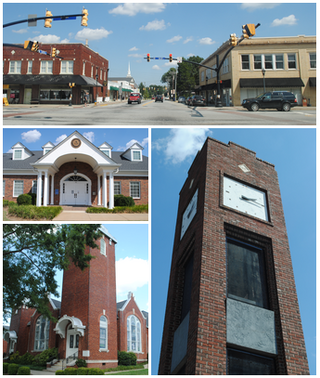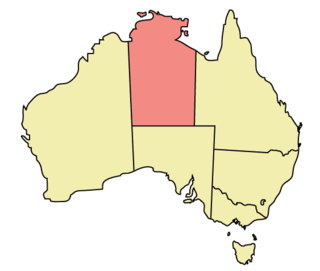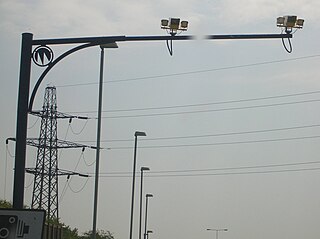Related Research Articles

Simpsonville is a city in Greenville County, South Carolina, United States. It is part of the Greenville, SC Metropolitan Statistical Area. The population was 23,354 at the 2020 census, up from 18,238 in the 2010 census. Simpsonville is part of the "Golden Strip", along with Mauldin and Fountain Inn, an area which is noted for having low unemployment due to a diversity of industries including H.B. Fuller, KEMET, Sealed Air and Milliken. It is the 23rd-most populous city in South Carolina.
A violent crime, violent felony, crime of violence or crime of a violent nature is a crime in which an offender or perpetrator uses or threatens to use harmful force upon a victim. This entails both crimes in which the violent act is the objective, such as murder, assault, rape and assassination, as well as crimes in which violence is used as a method of coercion or show of force, such as robbery, extortion and terrorism. Violent crimes may, or may not, be committed with weapons. Depending on the jurisdiction, violent crimes may be regarded with varying severities from homicide to harassment.
Crime in Canada is generally considered low overall. Under the Canadian constitution, the power to establish criminal law & rules of investigation is vested in the federal Parliament. The provinces share responsibility for law enforcement, and while the power to prosecute criminal offences is assigned to the federal government, responsibility for prosecutions is delegated to the provinces for most types of criminal offences. Laws and sentencing guidelines are uniform throughout the country, but provinces vary in their level of enforcement.
Crime in Washington, D.C., is directly related to the city's demographics, geography, and unique criminal justice system. The District's population reached a peak of 802,178 in 1950. Shortly after that, the city began losing residents, and by 1980 Washington had lost one-quarter of its population. The population loss to the suburbs also created a new demographic pattern, which divided affluent neighborhoods west of Rock Creek Park from the less well-off neighborhoods to the east.

Crime in Sweden is defined by the Swedish Penal Code and in other Swedish laws and statutory instruments.

Crime in the Northern Territory is managed by the Northern Territory Police, the territory government's Department of the Attorney-General and Justice and Territory Families.
Crime in the United Kingdom describes acts of violent crime and non-violent crime that take place within the United Kingdom. Courts and police systems are separated into three sections, based on the different judicial systems of England and Wales, Scotland, and Northern Ireland.

Crime has been recorded in the United States since its founding and has fluctuated significantly over time. Most available data underestimate crime before the 1930s, giving the false impression that crime was low in the early 1900s and had a sharp rise after. Instead, violent crime during the colonial period was likely three times higher than the highest modern rates in the data we have, and crime had been on the decline since colonial times. Within the better data for crime reporting and recording available starting in the 1930s, crime reached its broad, bulging modern peak between the 1970s and early 1990s. After 1992, crime rates have generally trended downwards each year, with the exceptions of a slight increase in property crimes in 2001 and increases in violent crimes in 2005–2006, 2014–2016 and 2020–2021. As of July 1, 2024 violent crime was down and homicides were on pace to drop to 2015 levels by the end of the year.
As of 2018 Detroit had the fourth highest murder rate among major cities in the United States after St. Louis and Baltimore and the 42nd highest murder rate in the world. The rate of robberies in Detroit declined by 67% between 1985 and 2014 while the rate of aggravated assaults increased. As a whole, the city's crime rate has decreased considerably from its 1980s peak.
Crime in Chicago has been tracked by the Chicago Police Department's Bureau of Records since the beginning of the 20th century.

Crime in New Zealand encompasses criminal law, crime statistics, the nature and characteristics of crime, sentencing, punishment, and public perceptions of crime. New Zealand criminal law has its origins in English criminal law, which was codified into statute by the New Zealand parliament in 1893. Although New Zealand remains a common law jurisdiction, all criminal offences and their penalties are codified in New Zealand statutes.

Figures on crime in London are based primarily on two sets of statistics: the Crime Survey for England and Wales (CSEW) and police recorded crime data. Greater London is generally served by three police forces; the Metropolitan Police which is responsible for policing the vast majority of the capital, the City of London Police which is responsible for The Square Mile of the City of London and the British Transport Police, which polices the national rail network and the London Underground. A fourth police force in London, the Ministry of Defence Police, do not generally become involved with policing the general public. London also has a number of small constabularies for policing parks. Within the Home Office crime statistic publications, Greater London is referred to as the London Region.
In 2019, 43,686 crimes were reported in the U.S. state of Michigan. Crime statistics vary widely by location. For example, Dearborn has a murder rate of only 2.1 per 100,000 while sharing borders with Detroit and Inkster, some of the highest rates in the state.
In 2010, 356 people were murdered in the U.S. state of Tennessee. In 2009 and 2010, Tennessee had the highest rate of violent gun crime of any US state, although less than that of Washington D.C. Tennessee ranked highest in the nation for the rate of aggravated assaults with a firearm, and ranked fifth-worst in robberies.

Road speed limit enforcement in the United Kingdom is the action taken by appropriately empowered authorities to attempt to persuade road vehicle users to comply with the speed limits in force on the UK's roads. Methods used include those for detection and prosecution of contraventions such as roadside fixed speed cameras, average speed cameras, and police-operated LIDAR speed guns or older radar speed guns. Vehicle activated signs and Community Speed Watch schemes are used to encourage compliance. Some classes of vehicles are fitted with speed limiters and intelligent speed adaptation is being trialled in some places on a voluntary basis.
The relationship between race and crime in the United Kingdom is the subject of academic studies, government surveys, media coverage, and public concern. Under the Criminal Justice Act 1991, section 95, the government collects annual statistics based on race and crime.
In 2014, the city of Memphis ranked eleventh in violent crimes for major cities around the U.S. In 2006, Memphis led the nation in number of violent crimes. In 2001, 2005, and 2007, Memphis ranked second most dangerous in the nation among cities with a population over 500,000. It also ranked as most dangerous in 2002. There are approximately 182 gangs in Memphis, Tennessee with 8,400 gang members in the county.
Memphis, Tennessee serves as the Southern headquarters for Tennessee based street organizations in the Southern United States. In 2021, there were approximately 102 gangs with 13,400 gang members in the city.
In the United States, the practice of predictive policing has been implemented by police departments in several states such as California, Washington, South Carolina, Alabama, Arizona, Tennessee, New York, and Illinois. Predictive policing refers to the usage of mathematical, predictive analytics, and other analytical techniques in law enforcement to identify potential criminal activity. Predictive policing methods fall into four general categories: methods for predicting crimes, methods for predicting offenders, methods for predicting perpetrators' identities, and methods for predicting victims of crime.
Houston's murder rate in 2005 ranked 46th of U.S. cities with a population over 250,000 in 2005. In 2010, the city's murder rate was ranked sixth among U.S. cities with a population of over 750,000 according to the Federal Bureau of Investigation (FBI). Houston had over 400 homicides in 2020 and 473 by the end of December 2021 a predicted increase of 30% year on year.
References
- 1 2 Tony Thompson (25 July 2010). "Crime software may help police predict violent offences". The Observer. Retrieved 26 July 2010.
- ↑ Jim Ericson (21 July 2010). "A Cop When You Need One". Information Management. Retrieved 26 July 2010.
- ↑ Jennings, Richi (27 July 2010). "Minority Report is reality, kinda (and APIEpicFail)". computerworld.com. Retrieved 13 August 2019.
- ↑ Crawford, David (September–October 2015). "CRASH Predicts 'unpredictable' in traffic incidents". ITS International. Retrieved 13 August 2019.